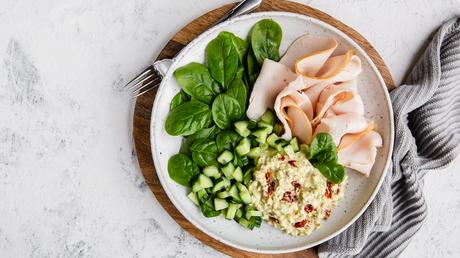
If you have followed Diet Doctor over the past few years, you may have seen our content suggesting that, for many people, eating higher protein foods improves satiety and r educes overall calorie intake. Multiple scientific papers back the association between protein intake and eating fewer calories.
However, a new preprint paper is getting attention on social media. It concludes that eating more protein increases calorie intake. How could this be? Who is right? Does protein increase or decrease subsequent calorie intake?
To answer that question, as is often the case, we need to look at the specifics of the study. It makes a difference if we talk about short-term satiety such as food intake between two meals, or longer-term intake over weeks or months. The recent paper reports on the former, but the conclusion is anything but clear cut.
Kevin Hall, Ph.D., and colleagues published a preprint (it has not yet undergone peer-review or been published in an official journal) titled A data-driven approach to quantifying meal characteristics influencing energy intake.
This is not a new trial. Instead, the authors compiled data from two intervention trials, one comparing ultra-processed and unprocessed diets and another comparing low carb and lowfat diets. Combining the results of the two trials makes the data cumbersome, inconsistent, and a little dizzying to make sense of. I will do my best to simplify the data, but the confusing nature of the results highlights the need for cautious interpretation.
Both trials included in this paper were short-term, two-week trials in young, healthy individuals who checked in to an in-patient metabolic ward, so researchers accurately measured food intake and physical activities.
Even though the original trials were randomized crossover trials, this paper is an observational analysis of the data - meaning the findings are a weaker quality of evidence than if the outcomes were prespecified outcomes of the original trial. Being weaker quality data doesn't invalidate the data - but it means we have to interpret the findings with caution.
The other crucial detail is that the authors measured how food intake at one meal influences calorie intake at the next meal. That is a short time frame for an evaluation and is what we would call "short-term satiety." This is very different than evaluating what happens to long-term satiety with calorie intake over weeks or months.
The study reported that eating food with higher energy density, more processing, and faster chewing times correlates with increased calorie intake. That is not surprising.
Eating more calories at one meal correlates with eating fewer calories at the next meal, but only if the food is minimally processed - this was not seen in highly processed meals. This suggests that highly processed foods "hijack" our caloric satiety sensor so that we continue to overeat calories despite having eaten more calories at the previous meal. Again, this is an outcome that prior research would predict.
But what about protein?
When looking at highly processed vs. unprocessed meals, the authors conclude that higher protein intake correlates with eating more calories in the same meal in unprocessed diets only. But when looking at low carb vs. low-fat diets, protein intake did not correlate with eating more calories.
A little confusing, right? Why would protein have an effect only in the study comparing processed vs. unprocessed foods, and not in the low carb vs low fat study?
It gets even more confusing regarding calorie intake at the next meal.
The authors reported:
- higher protein in one meal correlated with increased calorie intake at the subsequent meal in both groups in the study that compared low fat and low carb diets;
- comparing highly processed vs. unprocessed meals, protein intake did not correlate with more or less calorie intake at the next meal in the unprocessed meals;
- in highly processed meals, more protein correlated with less calorie intake at the next meal.
So how do we make sense of the different effects of protein intake with different diets?
I caution against giving these findings too much weight. Remember, they are retrospective observational analyses of data - data that suffer from confounding variables and are much poorer quality than intervention trials. I think it is easy to over-interpret these data and find reasons to explain why the trends differ. But it all comes back to the low quality of evidence and lack of a consistent pattern.
We should also note that the diets averaged 15% protein in the study. In other trials, longer-term 12-week studies report that eating 30% protein improves satiety and lowers calorie intake compared to 15% protein. Additionally, women with obesity lost more body fat with a 25% protein than a 15% protein diet, Plus, higher protein low fat diets resulted in better weight loss than lower protein diets.
At the same time, we also have to acknowledge some populations - like traditional Okinawans - maintain a healthy weight and low incidence of metabolic disease with very low (just 10% of energy) protein diets. But as Dr. Ted Naiman has pointed out, weight is not the only important variable. Lean muscle is also crucial for healthy aging, and higher protein intake improves lean muscle mass.
So, should you be concerned because this study reports that participants eating more protein ate more calories?
No, not in my opinion. If we focus on primary outcome trials and longer-term results, it seems clear that higher protein - up to 30% of calories - leads to reduced overall calorie intake and improved healthy weight loss.

